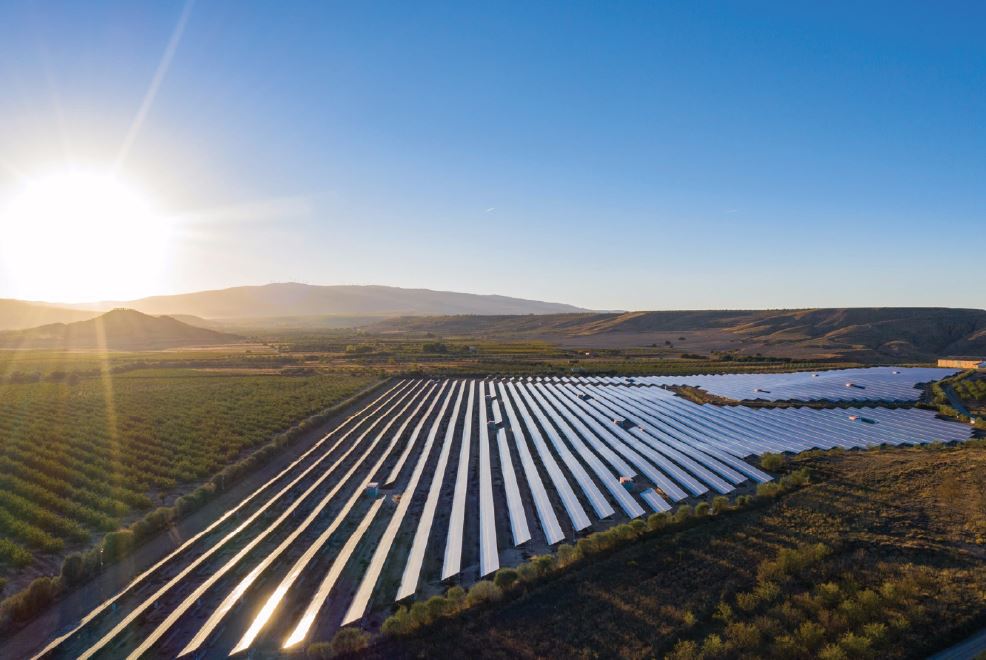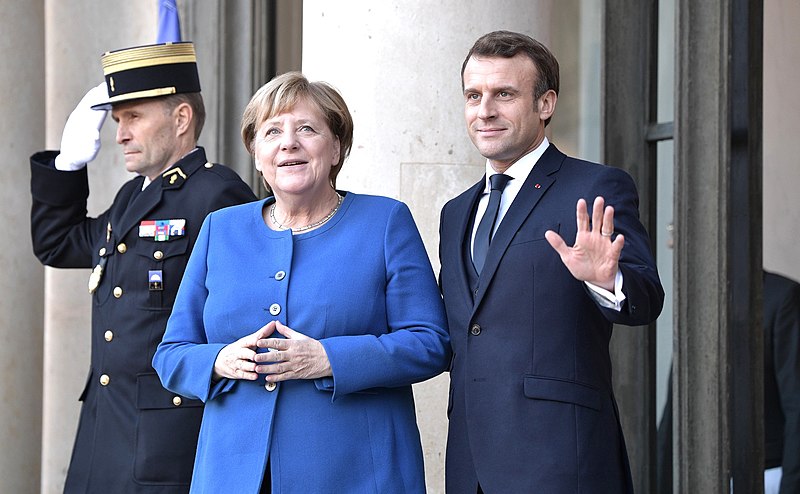[vc_row][vc_column width=”1/2″][vc_column_text]
Spain
The light green area is the rest of the European Union
Spain was the 14th largest economy in the world by nominal GDP in 2018. Its GDP per capita was $30,524 USD. It is the second largest country in the EU by geographical area and had the fourth largest population (excluding the UK) in 2019. It was ranked 32nd in the World Bank's Human Capital Index and 28th in the Economic Complexity Index in 2017. It is a member of the EU and OECD. Services was the largest economic sector in 2018 (65.9 percent of GDP), followed by manufacturing (12.6 percent), and agriculture (2.6 percent). In 2017, the largest export sectors were services (30.3 percent), vehicles (14 percent), agriculture (13.65 percent), and chemicals (10.6 percent). The largest individual exports were travel and tourism (15.6 percent), ICT services (9.27 percent), cars (7.64 percent), and transport services (4.05 percent). Its largest export partners were France (14.6 percent), Germany (10.89 percent), Italy (7.69 percent), Portugal (6.99 percent), and the UK (6.58 percent). The largest goods imports were crude oil (6.59 percent), cars (5.61 percent), and parts of motor vehicles (3.71 percent). Economic growth was relatively slow in the eighteenth and first half of the nineteenth century. Industrialisation began in the 1860s but did not progress to an advanced level until the 1960s. The depression and civil war also hurt growth as did the early economic policies of Franco. Between 1950 and 1974 the economy grew strongly as capital deepened and total-factor productivity increased. It also benefitted from trade liberalisation after the 1959 Stabilisation Plan. The 1970s oil shocks brought an end to the growth and the post Franco governments were unable to deliver necessary structural reforms. In the 1990s and up until the global financial crisis the economy boomed as foreign credit fuelled the construction and housing industry. The global financial crisis hit hard. Initial stimulus gave way to austerity, and growth did not return until 2014. Since then the economy has performed well benefitting from increased labour productivity, reduced labour costs, and the return of FDI.
[/vc_column_text][vc_column_text] Its population in 2018 was 46,397,452 [1]
Its population in 2018 was 46,397,452 [1]
 In 2015, 16.25% of its total energy
In 2015, 16.25% of its total energy
consumption was renewable [2]
 In 2021, its GDP grew by 5.13% [2]
In 2021, its GDP grew by 5.13% [2]
 In 2021 it had a positive Current
In 2021 it had a positive Current
Account Balance of US$bn 13.43 [3]
 Its unemployment rate in 2021 was 14.79% [3]
Its unemployment rate in 2021 was 14.79% [3]
 Its Expenditure on R&D (as a percentage of
Its Expenditure on R&D (as a percentage of
GDP) in 2020 was 1.41% [2]
What free trade areas or economic unions is it a member of?
Member of the European Union (EU) since 01/01/1986
Other members:
Austria, Belgium, Bulgaria, Croatia, Cyprus, Czechia, Denmark, Estonia, Finland, France, Germany, Greece, Hungary, Ireland, Italy, Latvia, Lithuania, Luxembourg, Malta, Netherlands, Poland, Portugal, Romania, Slovakia, Slovenia, Sweden
What trade deals are there between European Union and other countries and economic unions?
EU - Andorra Customs Union (from 01/01/1991)
European Single Market (SM) (from 01/01/1993)
EU - Sri-Lanka Co-operation and Partnership Agreement (from 01/04/1995)
EU - Türkiye Customs Union (from 31/12/1995)
EU - Faroe Islands Agreement (from 01/01/1997)
EU - Palestinian Authority Interim Association Agreement (from 01/07/1997)
EU - Tunisia Association Agreement (from 01/03/1998)
EU - Armenia Partnership and Cooperation Agreement (from 09/09/1999)
EU - Morocco Association Agreement (from 01/03/2000)
EU - Israel Association Agreement (from 01/06/2000)
EU - Mexico Global Agreement (from 01/10/2000)
EU - San Marino Customs Union (from 01/04/2002)
EU - Jordan Association Agreement (from 01/05/2002)
EU - North Macedonia Stabilisation and Association Agreement (from 01/04/2004)
EU - Pakistan Co-operation agreement (from 29/04/2004)
EU - Egypt Association Agreement (from 01/06/2004)
EU - Chile Association Agreement and Additional Protocol (from 01/03/2005)
EU - Algeria Association Agreement (from 01/09/2005)
EU - Lebanon Association Agreement (from 01/04/2006)
EU - Albania Stabilisation and Association Agreement (from 01/04/2009)
EU - Pacific States Interim EPA (from 20/12/2009)
EU - Montenegro Stabilisation and Association Agreement (from 01/05/2010)
EU - Central America Association Agreement (from 01/08/2013)
EU - Serbia Stabilisation and Association Agreement (from 01/09/2013)
EU - Bosnia and Herzegovina Stabilisation and Association Agreement (from 01/06/2015)
EU - South Korea Free Trade Agreement (from 01/07/2015)
EU - Kosovo Stabilisation and Association Agreement (from 01/04/2016)
EU - Georgia Association Agreement (from 01/07/2016)
EU - Moldova Association Agreement (from 01/07/2016)
EU - Canada Comprehensive Economic and Trade Agreement (CETA) (from 21/09/2017)
EU - Eswatini (SADC) Economic Partnership Agreement (from 05/02/2018)
EU - Lesotho (SADC) Economic Partnership Agreement (from 05/02/2018)
EU - Mozambique (SADC) Economic Partnership Agreement (from 05/02/2018)
EU - Namibia (SADC) Economic Partnership Agreement (from 05/02/2018)
EU - South Africa Economic Partnership Agreement (from 05/02/2018)
EU - Botswana (SADC) Economic Partnership Agreement (from 05/02/2018)
EU - Japan Economic Partnership Agreement (from 01/02/2019)
EU - Eastern and Southern Africa States free trade agreement (from 07/02/2019)
UK - EU Trade Deal (from 01/01/2021)
[/vc_column_text][vc_column_text]What trade deals are there with other countries and economic unions?
None
[/vc_column_text][/vc_column][vc_column width=”1/2″][vc_column_text]Uruguay: A Near-Perfect Country to Live, Work, and Play Post-Covid-19
CEO of McKinsey Spain and Portugal: Alejandro Beltrán — Pandemic Accelerates Changes Already Underway
Grupo T-Solar – The Generation Game: In 2020, That Means CSR, Environment, Efficiency and Opportunities for All Employees
Europe: Fig Leaves to Save Spain and Italy
Resistance Is Futile as Berlin Backs EU Solidarity
EU: Stage Set for Clash
Recession or Depression: Nadir Has Passed, Recovery Delayed
Europe’s Golden Eleventh Hour
No Quick Recovery for Europe
SegurCaixa Adeslas: Staying One Step Ahead in World of Health Insurance
Trade with the United Kingdom
Source: UK Office for National Statistics, October 2022.
Contains public sector information licensed under the Open Government Licence v3.0.


























































































